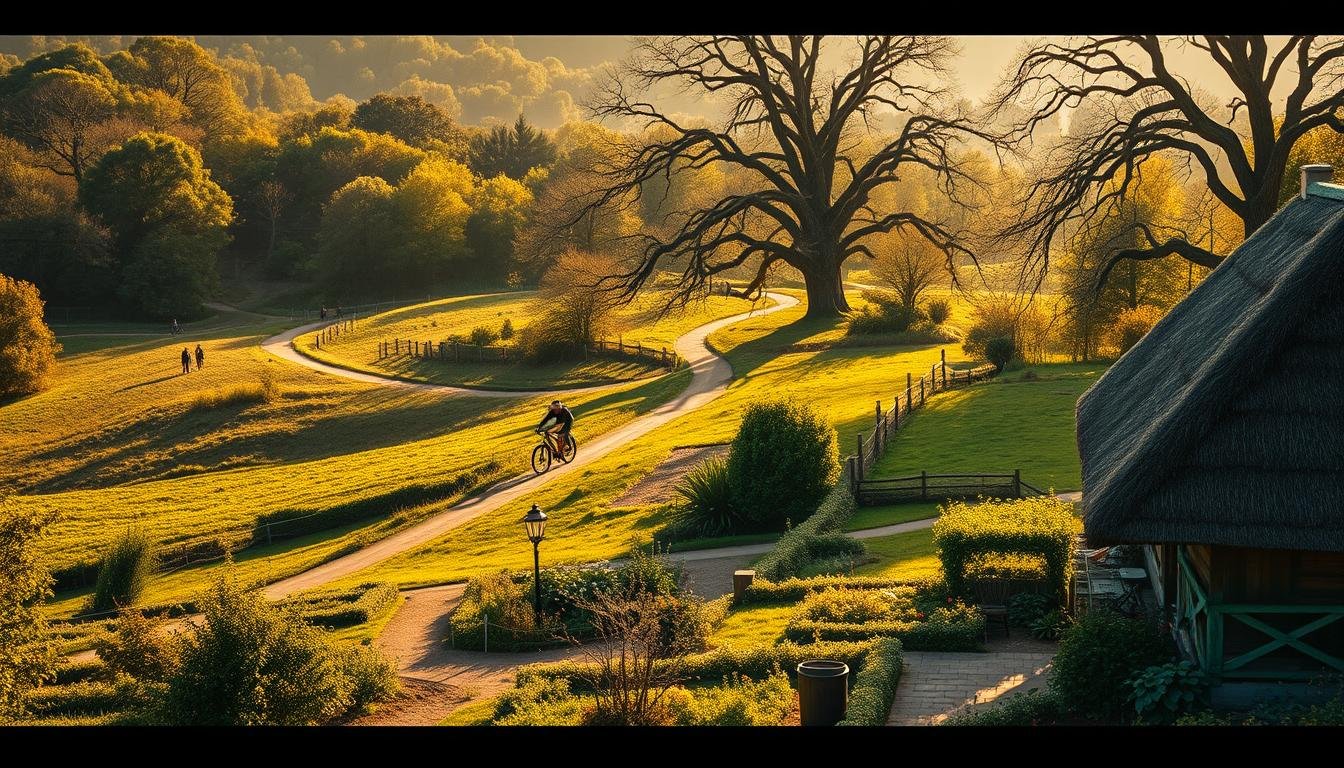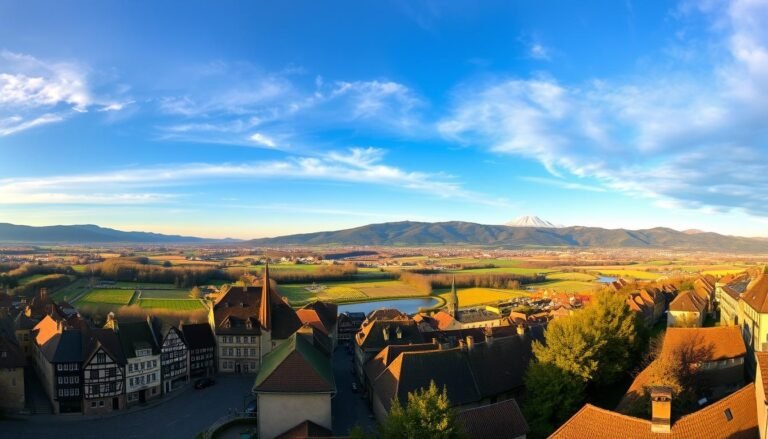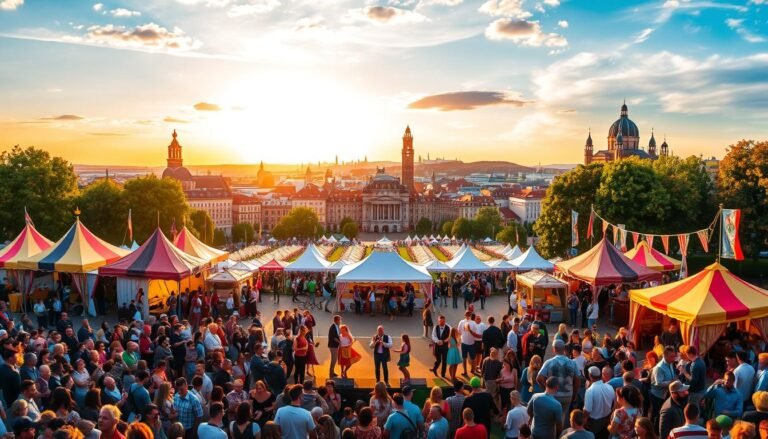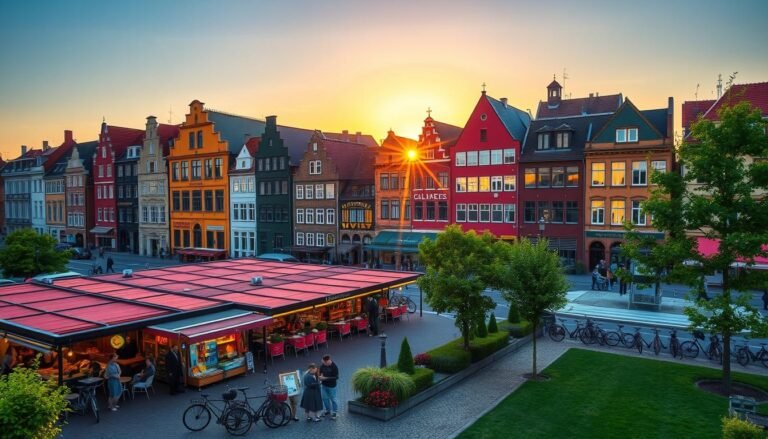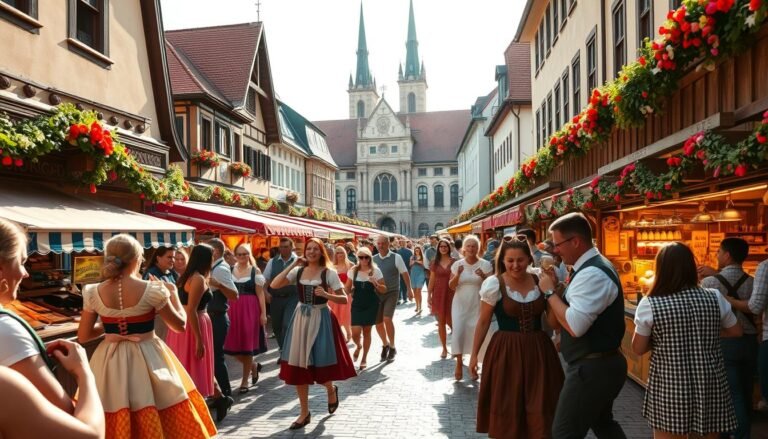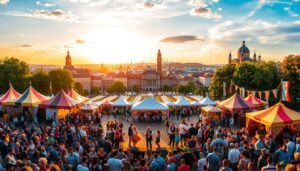The morning mist lifted slowly from the Black Forest valley as I pedaled my rented e-bike along a quiet country road. That moment changed everything I thought I knew about travel. Instead of rushing through tourist hotspots, I found myself breathing deeply, listening to cowbells in the distance, and feeling truly connected to the land beneath my wheels.
My journey into sustainable travel began three years ago when I realized my wanderlust was leaving a heavy carbon footprint. I wanted to explore the world without harming it. Rural Germany became my teacher, showing me that green travel isn’t about sacrifice—it’s about discovering richer, more meaningful experiences.
This guide shares everything I’ve learned about eco-tourism in Germany’s countryside. From cozy organic farm stays to train journeys through stunning landscapes, you’ll discover how to travel responsibly while creating unforgettable memories. Rural Germany offers travelers a chance to step away from crowded cities and embrace a slower, more intentional way of exploring.
Key Takeaways
- Rural Germany provides unique eco-tourism experiences away from mass tourism
- Green travel creates deeper connections with local communities and nature
- Sustainable transportation options include trains, e-bikes, and electric vehicles
- Eco-certified accommodations range from farm stays to green hotels
- Supporting local businesses helps preserve rural traditions and landscapes
- Planning ahead makes sustainable travel both easy and affordable
Table of Contents
ToggleWhy I Fell in Love with Sustainable Travel in Rural Germany
My journey into eco-tourism started three years ago. I found a small organic farm in Bavaria. It was a weekend getaway that changed my life, showing me the beauty of green travel.
My First Encounter with German Eco-Tourism
I arrived at Hofgut Oberfeld near Darmstadt on a rainy Friday. The farm uses solar panels and collects rainwater. Fresh veggies grew right next to the guest cottages.
That night, I had dinner with the farm family. They served food grown just outside. It was more than a place to stay; it was a glimpse into a sustainable lifestyle.
The Beauty of Slow Travel in the German Countryside
Slow travel taught me to enjoy every moment. In the Black Forest, I spent days hiking and learning about forestry. Along the Romantic Road, I cycled at my own pace.
Every stop told a new story about living sustainably in rural Germany.
How Rural Communities Embrace Green Travel
German villages are experts in eco-friendly tourism. In Feldberg and Garmisch-Partenkirchen, guesthouses run on renewable energy. Traditional crafts like pottery and woodworking draw visitors while keeping heritage alive.
These communities show that green travel can create jobs and protect the environment.
Planning Your Eco-Friendly Journey Through Rural Germany
Planning a low-impact travel trip to rural Germany needs careful thought. I’ve learned that choosing the right time and making smart choices can make your trip eco-friendly. Rural Germany is great for responsible tourism, and with the right steps, you can enjoy nature and culture without harming the environment.
Choosing the Right Season for Low-Impact Travel
May and September to October are the best times to visit rural Germany. These months have fewer people, better green accommodations, and deeper connections with locals. The weather is also nice for biking and hiking, without the summer heat.
Mapping Out Sustainable Transportation Options
Germany’s rail network makes sustainable transportation simple. I use Deutsche Bahn for big trips and local buses for small villages. The Deutschland-Ticket lets you travel all over for just €49 a month, on trains, buses, and trams.
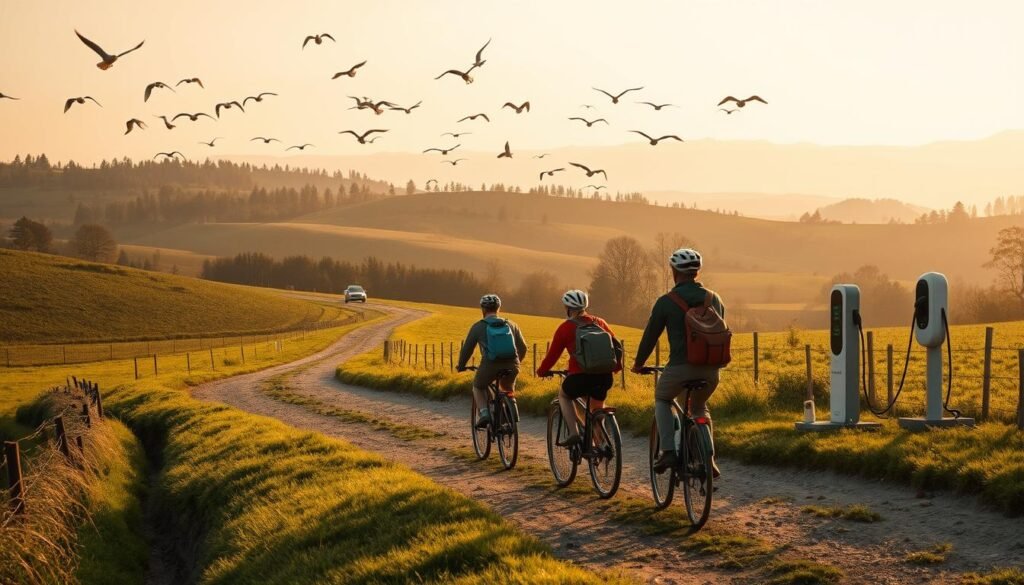
Finding Certified Green Accommodations
Look for places with Viabono, Green Key, or Bio Hotels certifications. These ensure they meet environmental standards. I’ve stayed at farm guesthouses and eco-lodges that are good for the planet, using renewable energy and local food.
| Certification | Focus Areas | Number of Properties |
|---|---|---|
| Viabono | Energy, water, waste management | Over 200 |
| Green Key | Environmental education, staff training | 150+ in Germany |
| Bio Hotels | Organic food, natural materials | 90 properties |
Packing Light and Eco-Conscious
I carry reusable water bottles, cloth bags, and eco-friendly toiletries. Buying local goods helps the economy and cuts down on waste. A small daypack, comfy shoes, and layers for the weather are all you need for a responsible trip to Germany’s countryside.
Discovering Farm Stays and Agritourism Adventures
Exploring sustainable travel in rural Germany through agritourism is truly authentic. The Urlaub auf dem Bauernhof network shows over 5,000 working farms welcoming visitors. It’s a chance to live their daily lives.
My top farm stays taught me new skills. In the Allgäu region, I helped with milking cows and making traditional mountain cheese. In Rhineland-Palatinate, I picked grapes in vineyards that have made wine for centuries.
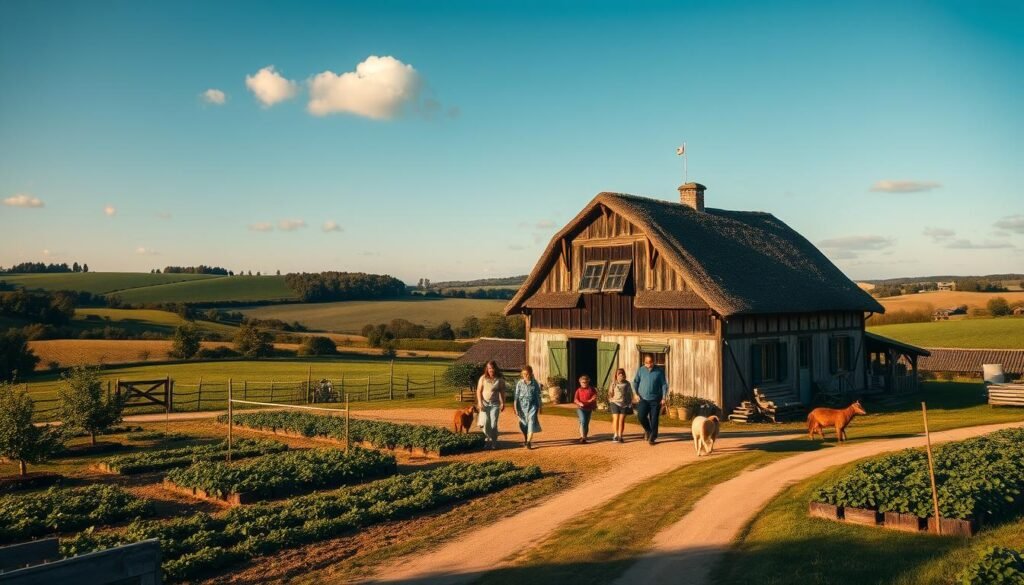
The accommodations vary greatly. I’ve stayed in restored 18th-century barns and cozy farmhouse rooms. Breakfast eggs come from chickens I fed the night before. Each stay connects me with families keeping Germany’s agricultural heritage alive.
Choosing agritourism helps family farms financially. It supports traditional farming while embracing modern sustainable travel practices. It’s a mix of cultural immersion and environmental care, showing the best of rural Germany.
Sustainable Travel, Rural Germany, Eco-Friendly Travel: Transportation Tips
Traveling in rural Germany doesn’t mean you have to harm the environment. The country has some of the best ways to travel without using a lot of carbon. You can ride trains, e-bikes, and more to see beautiful villages and landscapes while being kind to the planet.
Making the Most of Germany’s Excellent Train Network
Deutsche Bahn’s rail system makes traveling easy and green. Long-distance trains run on 100% renewable energy. This makes me feel good about my carbon footprint.
Regional passes like the Bayern-Ticket let you explore states for about €27 a day. I often take early morning trains to get to hiking trails and small towns that buses miss.
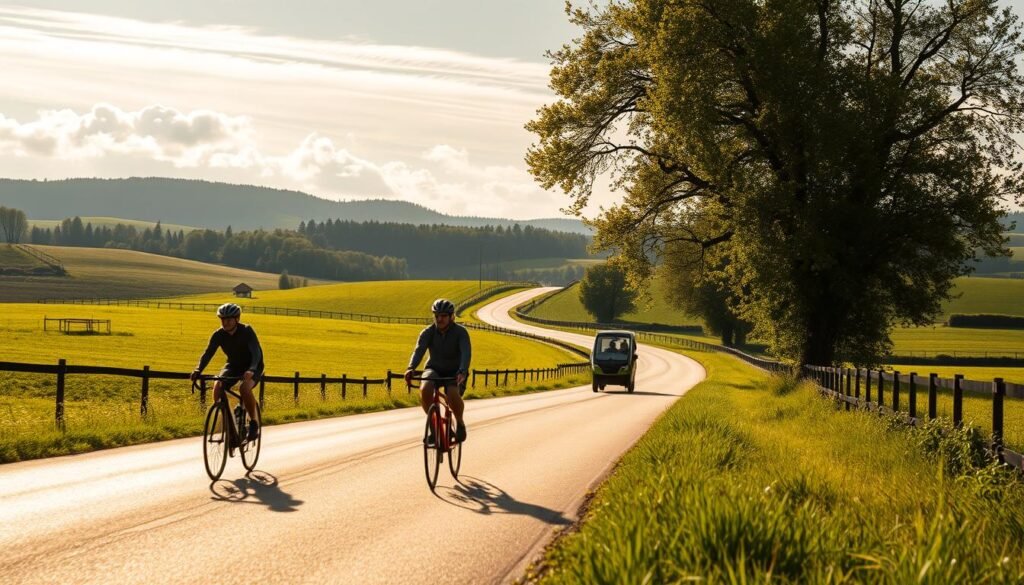
Renting E-Bikes for Rural Exploration
E-bikes have changed how I see the German countryside. Movelo offers electric bikes in many areas, perfect for hills. Renting costs about €25-35 a day.
These bikes let me go 40-60 miles a day easily. I reach places cars can’t, like vineyards and forest paths.
Car-Sharing and Electric Vehicle Options
When trains and bikes can’t reach some places, electric car-sharing is a good choice. Share Now and Flinkster have EVs in many cities. I book one for day trips to places like the Black Forest’s hidden valleys.
Charging stations are common, even in rural areas.
| Transport Type | Daily Cost | CO2 Emissions | Best For |
|---|---|---|---|
| Regional Train | €25-40 | 0g (renewable energy) | Town hopping |
| E-Bike Rental | €25-35 | Near zero | Nature trails |
| Electric Car Share | €50-80 | 0g (when charged green) | Remote villages |
Using trains, e-bikes, and electric cars makes for a great rural adventure. I take trains between regions, rent e-bikes for local trips, and use electric cars only when needed. This way, I travel green and explore Germany’s rural wonders.
Nature-Based Tourism Activities That Give Back
Exploring rural Germany through nature-based tourism has shown me the power of travel. It’s about leaving a place better than when I arrived. Whether I’m helping with conservation or exploring trails that help local communities, I feel a deeper connection to Germany’s nature.
Participating in Conservation Projects
My most rewarding moments come from volunteering with NABU (Nature and Biodiversity Conservation Union). Last summer, I helped restore wetlands in the Spreewald Biosphere Reserve. We planted native plants and removed invasive species, learning about local ecosystems.
These efforts let me directly help protect Germany’s biodiversity. Many projects welcome volunteers from around the world. They offer free accommodation in exchange for help with various tasks.
Wildlife Watching with Responsible Tour Operators
Choosing guides who care about animal welfare is key to responsible tourism. In Bavarian Forest National Park, I tracked lynx and wolves with a certified eco-tourism operator. Our group kept a safe distance and followed strict rules.
The guide explained how our fees support conservation research and anti-poaching efforts. These experiences taught me patience and respect for nature.
Hiking Trails That Support Local Communities
Trails like the Rheinsteig and Eifelsteig are great examples of nature-based tourism that helps communities. My hiking fees support trail upkeep and local businesses. I stay in family-run guesthouses and eat at village restaurants, helping the local economy.
The trail associations use profits for conservation and cultural preservation. This creates a cycle that protects nature and traditions.
Supporting Local Communities Through Responsible Tourism
Traveling through rural Germany fills my heart with joy. I know my journey helps the families and businesses I meet. Responsible tourism makes real connections that change both visitors and hosts.
Shopping at weekly farmers’ markets is perfect for sustainable travel and cultural learning. In Quedlinburg’s market square, I buy fresh produce from farmers who’ve worked the land for years. It’s real—tasting fresh tomatoes while talking with the farmer in my basic German.
Family-run gasthofs are my go-to for dinner. These traditional inns serve local dishes made from nearby ingredients. By eating here, I keep my money in local communities.
| Activity | Community Impact | Visitor Experience |
|---|---|---|
| Farmers’ Markets | Direct income to producers | Fresh local foods, cultural exchange |
| Craft Workshops | Preserves traditional skills | Hands-on learning, unique souvenirs |
| Local Festivals | Funds community projects | Authentic cultural immersion |
Attending festivals like Erntedankfest adds magic to green travel. I’ve learned pottery in Kannenbäckerland workshops. Master craftspeople share old methods. These experiences help the economy and keep culture alive for the future.
My Favorite Environmentally-Conscious Travel Experiences in Rural Germany
My most cherished memories come from traveling in rural Germany. Each trip showed that sustainable choices make travel better. I’ll share moments that made a big impact and showed the beauty of nature-based tourism.
Staying at Gut Kerschlach eco-lodge in Bavaria was a game-changer. It runs on renewable energy. I watched deer graze and enjoyed coffee from local beans. The Harz National Park offered a unique adventure. I hiked for three days, spotting wild boar at sunset.
Cycling the Elbe River was a proud moment. I used my own power and ferries to cross. Autumn at Weingut Odinstal winery in Rheinhessen taught me about biodynamic farming. I picked grapes and tasted amazing wines. Winter in the Black Forest was magical, with cross-country skiing through snow.

